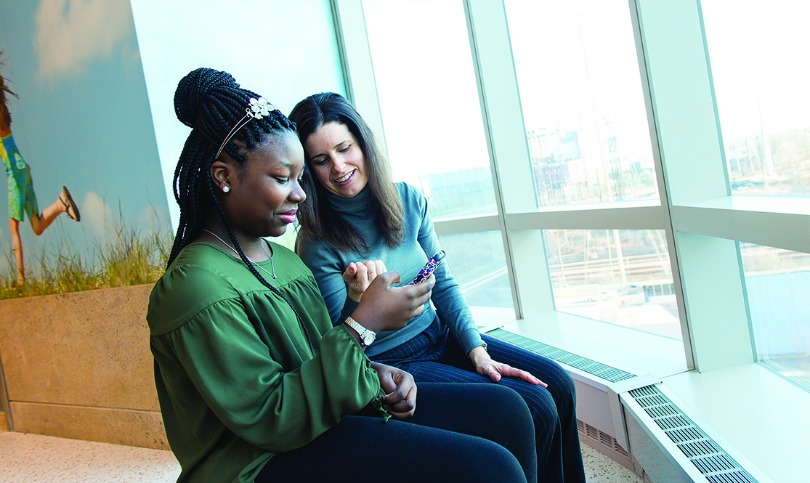Being a teen or young adult can be tough. Being a teen or young adult who has survived cancer is even tougher. Read on for more about the unique challenges adolescent and young adult (AYA) survivors face, and how a St. Baldrick’s researcher is reaching out to help.

Psychologist Dr. Lisa Schwartz and a patient look at the health app that she’s using in her texting intervention study.
The teenage and young adult years are a time of discovery, a time to map out one’s identity, and to stretch into what could be. Those years are a coming-of-age dance, with a side of hormones, prom dates, and boundary pushing.
Sometimes it’s a little awkward, and maybe filled with more than a few mistakes. But as much as some of us wanted to skip right over them, those years are crucial.
But what happens when cancer is thrown into the mix?
That already rough developmental period gets rockier.
“Adolescents and young adults just want to be normal and any violation of that is so hard for them, whether it’s losing hair, being more dependent on parents, or not being able to see their friends every day or play sports,” said St. Baldrick’s researcher Dr. Lisa Schwartz. “I think they’re definitely more impacted by that — by the disruption to typical AYA development — than a younger school-age child would be, who’s happy to be with mom all the time.”
Their cancers can also be tougher to treat than cancer in younger kids. The cancers are often higher risk, the psychologist explained, and the diagnosis is often delayed.
“A teenager complaining that they’re fatigued or withdrawn or their leg is cramping — it’s attributed to a whole host of things other than a possible cancer diagnosis, like that they are just being a teenager, that they’re having growing pains, or they’re depressed,” she said. “Or, on the flip side, a teenager just withholds the symptoms.”
Then, after battling cancer, there are more challenges. There’s the challenge of heading to college and of re-engaging with friends. There’s the possibility of late effects that can interfere with their lives. There’s the fear of relapse, which can lead to anxiety and avoidance of the doctor’s office.All of this is happening at a time when this age group is just starting to plan for their future, become more autonomous from their parents, establish intimate relationships outside of the family, and juggle their regular school or work responsibilities, Dr. Schwartz explained.
It’s a lot to handle for this unique group of survivors.
Read Mina’s story of having childhood cancer as a young adult >
Dr. Schwartz wants to help, and the psychologist aims to do that through their favorite communication method — texting.
In her St. Baldrick’s-funded study, Dr. Schwartz is looking at whether text messages sent through a special app can help cancer survivors live more healthy, balanced lives.
“The text messages really aim to give them messages about ways they can control their health, convey the importance of follow-up appointments, and improve health behaviors,” she said. “Then there are also messages about normalizing the struggles and giving them pointers on life after cancer, so things like managing getting back into school and anxiety about going back to the doctor.”

Sometimes, survivors in this age group miss follow-up appointments, which can make it hard for doctors to catch recurrences or problems from late effects early. Then there are the gaps in care when cancer survivors transfer from pediatric care to adult follow-up care, Dr. Schwartz explained.
“So, part of the reason I wanted to do this intervention is to really give them the message ahead of time that you need lifelong care,” she said. “We want to keep you healthy and maintain or improve your quality of life. Because what happens when they get to be adults and they’re ready to transfer their care to an adult follow-up provider, less than 50 percent actually do that.”
BLOG: 5 Facts About Childhood Cancer Survivors >
But it’s not just about making sure these survivors see a doctor. It’s about providing more, specialized care for AYAs. Dr. Schwartz wants to see care for AYAs that is as unique as they are, to support them as they face their unique sets of challenges.
Her goal is to help these young survivors get a sense of normalcy back, while supporting them in facing their challenges with open eyes.
“I’m hoping to plant the seed early on … that we want them to get back into normal life and enjoy it,” she said. “But there are things you still need to do to stay healthy and make sure that you’re OK.”
It’s Childhood Cancer Awareness Month. Help childhood cancer survivors get the care they need and the future they deserve.
Read more on the St. Baldrick’s blog:


 SBF
Tweets »
SBF
Tweets »